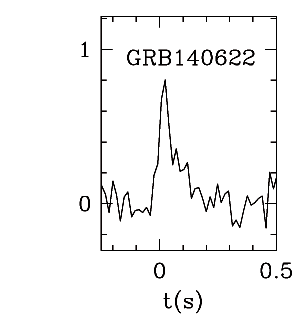GRB 140622A
Time: 09:36:04
Trigger Number: 602278
Burst Advocate: Valerio D'Elia
BAT Data:
| RA: a | 317.153 21:08:36.7 |
| Dec: a | -14.412 -14:24:43.2 |
| 90% Error Radius: b | 2.5 |
| T90: c | 0.13 |
| Fluence: d | 0.27 (0.05) |
| 1s Peak Photon Flux: e | 0.6 (0.2) |
| Photon Index: f | n/a (n/a) |
90% error in parentheses,
a J2000;
b arcmin;
c seconds;
d 10-7 erg/cm2 (15-150 keV);
e ph/cm2/sec (15-150 keV);
f PL = simple power-law, CPL = cutoff power-law (15-150 keV)
BAT Light Curve:

XRT Data:
| RA: a | 21:08:41.56 |
| Dec: a | -14:25:09.5 |
| 90% Error Radius: b | 2.4 |
| Time to First Observation: c | 93.40 |
| Early Flux: d | n/a |
| 11 Hour Flux: d | 0.00000000000000006518467 |
| 24 Hour Flux: d | 0.000000000000000000368344 |
| Initial Temporal Index: | -6.634 |
| Spectral Index (Gamma): | 1.5546 |
| Column Density (NH): e | 0.547200249501 |
Note: Please be aware that only the very basic temporal and spectral quantities are reported here. You are strongly encouraged to see the referenced GCN circulars for full details.
a J2000;
b arcsec;
c seconds;
d 10-11 erg/cm2/s (0.3-10 keV);
e 1021 cm-2
» XRT GRB Live Catalogue
» XRT Light Curves
» XRT Spectra
UVOT Data:
| RA: a | n/a |
| Dec: a | n/a |
| 90% Error Radius: b | n/a |
| Time to First Observation: c | 97 |
| V Magnitude: | V>19.6 |
| Other Filter Magnitudes: | B>20.1 U>20.2 UVW1>19.6 UVM2>20.6 UVW2>20.2 White>21.2 |
a J2000; b arcsec; c seconds
Other Burst Info:
Redshift:~0.959 (VLT: emission from host)Host Galaxy:
Other Observatory Detections:
Comments:
BAT: From the BAT spectrum, this event does not appear to be a short hard burst. The quickly fading X-ray lightcurve, however (to be reported in a later circular), does appear consistent with a SHB, and does not appear to be similar to the lightcurves of SGRs or other Galactic sources.
UVOT: no detection
References:
BAT: GCN 16433; GCN 16438
XRT: GCN 16433; GCN 16434; GCN 16439; Evans et al., 2009, MNRAS, 397, 1177
UVOT: GCN 16433; GCN 16446
Radio:
Redshift: GCN 16437 (VLT)
Host: GCN 16437 (VLT)
Other:
